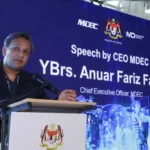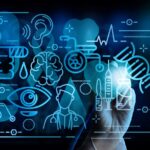Its COO and legal counsel, Kelly Chung shares initial challenges and interesting developments, not least of which is how they are supporting the ‘slow but sure’ opening up of country borders for travel.
EITN: What is Doctor2U? What does it do and who does it address?
Kelly: Doctor2u is the IT arm of the BP Healthcare Group, and Ali Health is the owner and operator of Doctor2U.
Ali Health, a member company of the BP Healthcare Group is the owner and operator of Doctor2U. The BP Healthcare group has been around for over 40 years, and serves over a million customers, annually.

When the group started in the early 80s, we were just a clinical lab. Over time we have expanded our healthcare services; today (what we offer) ranges from diagnostic services, specialist services, pharmacy, dental, environmental and food testing. So, we are the leading primary and secondary healthcare provider in the country.
Doctor2u is the IT arm of the BP Healthcare Group, and Ali Health is the owner and operator of Doctor2U.
And we have over 70 outlets nationwide, with presence in Singapore and Cambodia as well.
Our latest department is our digitalisation arm, which is Doctor2U.
Doctor2U is the IT arm of group, so we serve all the needs in respect of IT for the group. In addition to that, we also run the Doctor2U mobile app, which connects health professionals and health services via the platform.
We try to address and overcome the shortcomings of traditional healthcare delivery today by improving access to everyone regardless of their background, through technology. We also aim to reduce cost, to ensure efficiency of healthcare delivery, and improve patient outcomes.
EITN: How does Doctor2U serve the group’s internal healthcare IT needs?
Kelly: We have laboratory information systems which connect all our laboratory machines to a digital platform.
From the moment the customer books, say a health screening, it is done via the Doctor2U online platform. Payment is made online, and they pre-register their details.
We try to address and overcome the shortcomings of traditional healthcare delivery today by improving access to everyone regardless of their background, through technology. We also aim to reduce cost, to ensure efficiency of healthcare delivery, and improve patient outcomes.
Once the pre-registration is done they will receive a voucher with QR code which they have to present at the BP outlet of their choice.
The outlet does not need to re-register the customer details, because the customer’s details are already in the system. This minimises human error, as well as reduces use of paper.
The results of all testing done by the lab will be logged into the system as well, and can be conveniently accessed and viewed by the customer on the platform.
The digitisation of this whole process from booking of appointment for health screening, or for a doctor home visit, or x-ray screening, all the way to access and viewing of results/reports by the customer, is enabled by Doctor2U, our digitalisation arm.
EITN: What are the TOP challenges (business, user behaviour, regulatory, legacy) that exist currently that Doc2U can address?
Kelly: We have progressed a lot in this area. One of the challenges we faced initially is educating the public to gain their trust, so they accept healthcare delivery via digital means. This is because Malaysians, especially the elderly, are still very used to face-to-face consultation with their favourite family GP.
So initially, this was a challenge from 2015 to 2016 when we first started out. There was also a challenge pf recruiting doctors to provide their services, using our platform.
But, after a lot of effort to educate the public as well as healthcare professionals, to explain to them how our tech is secure and how we safeguard all the relevant stakeholders interest and rights, slowly we started to gain their trust.
Now, we have over 2000 doctors signed up to be on-demand on our platform, to offer telemedicine services (Live Chat and Video Consultation) and doctor home visits.
We have millions of users now on the Doctor2U platform. We are fortunate to have the support of the group.
Now, we have over 2000 doctors signed up to be on-demand on our platform, to offer telemedicine services (Live Chat and Video Consultation) and doctor home visits.
We have millions of customers coming through the app, thanks to the other collaborations (we have) with different government organisations and corporates, like MyEG and insurance providers.
EITN: Let’s talk about the tech side of things now.. could you share about the kind of resources that goes into creating a platform like Doc2U?
Kelly: Doctor2U is built in-house. We have a team of about 30 working on the platform, comprising of IT developers and support staff. We are supporting the entire group nationwide, from HQ, so there needs to be a robust team, operations-wise and technology-wise.
Our platform sits on Microsoft Azure and ensures that all data transmission is encrypted end-to-end. Of course from legal side, we ensure that every user that uses our app are made aware of how their personal information will be used and transmitted, and so on.
We are also pleased to share we are the first lab recognised by Singapore’s Ministry of Health,whereby anyone travelling to Singapore, with our QR code on the COVID 19 test certificate, would be verified instantly by our QR code.
Our QR code which is automatically readable by checkpoint authorities at the Singapore border, is based on blockchain technology, which is safe and secure. The QR code is a result of our collaboration with Temasek Group’s Affinidi.
Our QR code which is automatically readable by checkpoint authorities at the Singapore border, is based on blockchain technology, which is safe and secure. The QR code is a result of our collaboration with Temasek Group’s Affinidi.
EITN: What are your views about telemedicine in Malaysia?
Kelly: Our telemedicine platform consists of Live Chat and Video Consultation, and can be used (anywhere) regardless of location.
The telemedicine legal regulatory framework is still in process of being drawn up. We are looking forward to having something set in stone.
MOH is working hard on it, but since COVID- 19 hit Malaysia, we have been embracing telemedicine. As you can see on MySejahtera app, MOH are also promoting teleconsultation and digital health delivery. So it is high time a more robust framework is drawn up.
When COVID-19 hit, we saw a sudden spike in requests for home visit and testing. Because patients were afraid to walk into clinics and hospitals. They were willing to pay a premium to get a doctor to their location and perform a PCR testing there.
This became highly relevant, when the pandemic hit.
EITN: What is your approach when it comes to security of the platform and privacy of your users?
Kelly: The data we have, no doubt belongs to patient, and because we are dealing with health data and other sensitive information, we must ensure even more, so that their data is protected.
Like I mentioned, it is very important that the tech we use is water-tight and leakproof. We use Azure to ensure data transmission and everything done on the platform, is encrypted.
In terms of operations, we make sure that staff will handle personal data only on a needs basis. We don’t open it up the data to everyone in Doctor2U.
Thirdly, we must educate the users first before they receive our service, about what we do with their personal data and, who it is being shared to. We obtain the necessary consent from them.
Those are the steps and measures we take to ensure data is secured.
Thirdly, we must educate the users first before they receive our service, about what we do with their personal data and, who it is being shared to. We obtain the necessary consent from them.
EITN: Please also share about the partnerships that you have – What are the rationales that drive your partnerships and collaboration?
Kelly: There is a long list. A few notable ones are like with Blockchain-based tech company, Affinidi. We have various multiple collaborations with the government, for example serving a few hundred thousand PERKESO members with PCR screening before they go back to work, with our Back to Work programme.
Some MOH from samples were also outsourced to BP group to be tested. We have a collaboration with MyEG to screen foreign workers via swab and saliva PCR testing.
Other more interesting collaborations, for example are BonusLink and DHL, whereby members get preferential rates for PCR testing.
A more recent collaboration is with Enrich from Malaysia Airlines; Enrich members are eligible for COVID-19 screening and other health screening packages.
For phase 2, they will be able to exchange their Enrich miles for cash vouchers to obtain our health screening tests.
EITN: Can you share about your plans for the future?
Kelly: Ali Health aims to go for IPO. We also want to be the one-stop platform for all stakeholders, from patients, doctors, to governments entities, laboratories, pharmacies, insurance providers,
Our vision is to provide and improve healthcare delivery in the country through technology which we have demonstrated over the past few years.
Ali Health aims to go for IPO. We also want to be the one-stop platform for all stakeholders, from patients, doctors, to governments entities, laboratories, pharmacies, insurance providers,








